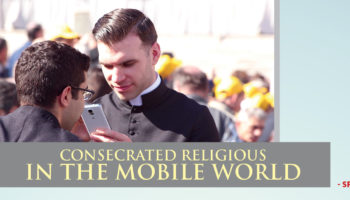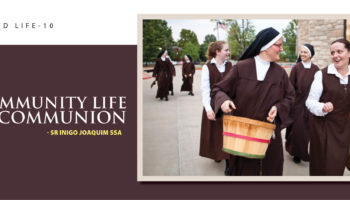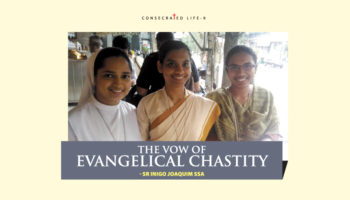The term “obedience’ is derived from the Latin ob-audire, which means “to listen intently”. It is primarily an attentive listening: to self, to others, to the events and experiences of life that demands a response. We are called to listen to the signs of our complex times and to respond with a new sense of mission. It requires that we should be attentive to the multiple ways in which God’s presence is revealed in the world around us. It always means fidelity to God. This vow is less and less concerned with questions of command and control and is less increasingly focussed on leaders. The basic meaning of obedience is listening. It is listening to God who speaks through our times, nature, various events, the Word of God, our conscience, our General Chapters, etc. This vow can be easily misunderstood. It needs to be grasped correctly, and practised meaningfully. We have to take more responsibility through dialogue and discernment.
The vow of obedience—which is an adult decision to seek and promote the mission of Jesus rather than personal glory—is very different from the parent-child relationship some religious communities encourage, where adult relationships and independent thinking are frowned upon. Obedience can be trivialized by being reduced to the question of dependence and permissions, rather than of serious adult responsibility for mission in the world. Inter-dependence is important.
The vow of obedience frees a religious from the human tendency to always put his/her own will first before God’s will. According to Saint Thomas Aquinas, obedience is the chief of the vows, for liberty is dearer to human beings than anything else. “In professing obedience, religious offer the full surrender of their own will as a sacrifice of themselves to God and so are united permanently and securely to God’s salvific will…Far from lowering the dignity of the human person, religious obedience leads it to maturity by extending the freedom of the children of God” (Perfectae Caritatis, 14).
Vatican II: A New Vision of Religious Obedience
- We need to remodel religious obedience and leadership. One of these changes emerged from the revised constitutions requiring greater participation and involvement of the religious in decision-making, such as community discernment, co-responsibility and subsidiarity.
- Obedience and the exercise of authority are carried out in a climate of listening and dialogue. Dialogue means an effort to listen to the other side with respect and sincerity, to understand what is being said, and jointly search the will of God. The superior exercises his/her responsibility with openness, respecting each person.
- The Vatican Council changed the meaning of the leader. S/he has power with and not power over! Coercive power, in general, is almost always understood hierarchically. Hierarchical authority armed with coercive power is seen as necessary for the common good to maintain order in the group. But, the Document on the Church insists that leadership is based on the shepherd model. As disciples of Jesus, we are all equals.
- Religious life is radically egalitarian. There are no children in religious life. So, there is no parental or age-based superiority. The traditional (colonial) system changed radically in the decades following the Council. Jesus insisted that there were no fathers, Rabbis or teachers among the disciples. (Mt 23: 5-11). Authority is service. It is given to us to do as much good as possible.
- According to Fr Robert Faricy SJ, obedience is a way to personal growth and fulfilment. Unfortunately, over the past few years, religious life has been criticized as dehumanizing, encouraging infantilism, and enslaving rather than freeing us. Obedience is not just a passive waiting for a command from legitimate superiors but a dynamic search for what pleases and glorifies the Lord.
- Obedience is for mission: Mission and obedience are two complementary and inseparable elements in the life of Christ. “The task of devoting themselves wholly to mission is therefore included in their call; indeed, by the action of the Holy Spirit, who is at the origin of every vocation and charism, consecrated life itself is a mission, as was the whole of Jesus’ life” (Vita Consecrata, 72). It also affirms that “more than external works, mission consists in making Christ present to the world through personal witness.” This is the primary task of consecrated life. By virtue of their consecration, religious persons are in mission.
- Both leaders and subjects should obey: After Vatican II, there was a gradual change felt and experienced by many. Gone are the days when the superior was the sole exerciser of authority and decision-maker, and the subjects, the obey-ers or even the conformists. The authority/superior figure was not really abolished but only the style of governance/leadership changed. All the members of the community, including superiors and subjects, obey. This obedience is primarily oriented towards obedience to the will of God.
- It is an exercise of the virtue of “prudence.” It is a difficult process. We must make a judgment or decision about what is the right thing to do in the present situation; what I am called to do here and now in response to the concrete situation in which I find myself. It is essential to consult and get guidance and to form one’s conscience.
Questions for Reflection/sharing:
- Which of the above clarifications struck you most? Why?
- Did any of the above statements surprise or confuse you? Which?
- What is the main purpose and meaning of the vow of obedience?
- Do we understand the theological virtue of “prudence” correctly? (That virtue does not mean caution, but the ability to make right decisions in concrete situations. It may include great daring and risk-taking, if the situation demands it.)
- In what sense is religious life “radically egalitarian”?
- Can you give an example of “power with” and “power over”?
- Why are listening and dialogue essential to religious obedience?
- Can a wrong exercise of leadership keep religious childish and immature? How?
- Do most religious come across as dynamic and mission-focussed, or frightened and immature?
- What is the best way for the superiors and everyone one to discover and do God’s will?

To subscribe to the magazine Contact Us





